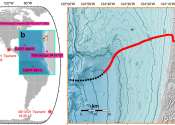Using existing undersea fiber cables to detect seismic events
A team of researchers with the National Physical Laboratory and the University of Edinburgh, Google and Istituto Nazionale di Ricerca Metrologica developed a way to use existing undersea fiber cables to detect seismic events. ...









